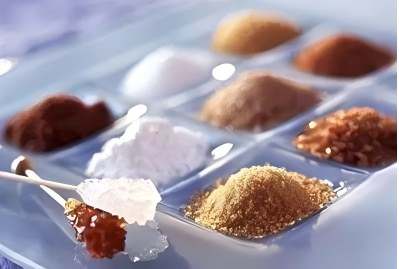-
Make a Call : +86 551 63500087
-
Get A Estimate : sales@gnfchem.com
¿QUÉ ESTÁS BUSCANDO?
¿QUÉ ESTÁS BUSCANDO?
Make a Call : +86 551 63500087
Get A Estimate : sales@gnfchem.com

La visión correcta de los edulcorantes: Descubriendo la verdad científica detrás del dulzor
Aug 12, 2025En la tendencia actual de reducir el azúcar como un enfoque generalizado para una alimentación saludable, edulcorantesLos edulcorantes, como sustitutos de azúcares tradicionales como la sacarosa, aparecen con frecuencia en diversos alimentos y bebidas. Sin embargo, la controversia en torno a ellos no ha cesado. Algunos los consideran "asesinos de la salud", mientras que otros los ven como "salvavidas del control del azúcar". De hecho, los edulcorantes en sí mismos no tienen una distinción absoluta entre buenos y malos. La clave reside en si podemos comprenderlos correcta y racionalmente.
I. Edulcorantes: El "dulce ayudante" en la era del control del azúcar
Los edulcorantes son aditivos alimentarios que aportan a los alimentos su sabor dulce. Suelen ser muy dulces y bajos en calorías, lo que permite satisfacer el antojo de dulces y reducir la ingesta calórica. Esta característica los convierte en una herramienta importante para prevenir enfermedades metabólicas como la obesidad y la diabetes. Por ejemplo, en las bebidas sin azúcar, el aspartamo, la sucralosa y otros edulcorantes se utilizan habitualmente para sustituir la sacarosa, conservando así el sabor dulce de las bebidas y permitiendo a los consumidores disfrutar de su exquisitez sin consumir azúcar en exceso. Para quienes necesitan controlar estrictamente su consumo de azúcar, como los diabéticos, los edulcorantes añaden más opciones a su dieta, permitiéndoles disfrutar ocasionalmente de alimentos dulces y aumentando su sensación de felicidad.
II. Clasificación científica: Comprensión de los miembros de la familia de los edulcorantes
Según sus fuentes y métodos de producción, los edulcorantes se pueden clasificar en dos categorías principales: naturales y artificiales. Los edulcorantes naturales, como el esteviósido y la roohafanina, se derivan de plantas naturales y se producen mediante procesos de extracción y purificación, y son los preferidos por los consumidores debido a su naturaleza "natural". Los edulcorantes artificiales, como el aspartamo, la sacarina y la sucralosa, se sintetizan mediante química artificial, presentan un dulzor extremadamente alto y una buena estabilidad, y se utilizan ampliamente en el procesamiento de alimentos. Ya sean edulcorantes naturales o artificiales, todos requieren estrictas evaluaciones de seguridad antes de su aprobación. Por ejemplo, el aspartamo, aunque en el pasado se debatió sobre su seguridad, ha sido evaluado en múltiples ocasiones por instituciones acreditadas como el Comité Mixto de Expertos en Aditivos Alimentarios (JECFA), confirmando su seguridad cuando se usa dentro de la dosis prescrita. Sin embargo, poblaciones especiales, como las personas con fenilcetonuria, deben evitar el consumo de alimentos que contengan aspartamo, lo que también refleja la consideración de las diferentes necesidades de salud de los distintos grupos.
III. Comprensión racional: Superando los conceptos erróneos sobre los edulcorantes
Durante mucho tiempo, han circulado muchos rumores sobre los edulcorantes, como que "causan cáncer" y "provocan obesidad". Estos rumores han hecho que muchos consumidores duden en usarlos. De hecho, la mayoría de estas afirmaciones carecen de base científica. La Organización Mundial de la Salud (OMS) y otras instituciones acreditadas han realizado investigaciones exhaustivas y han demostrado que, dentro del rango de uso y la dosis prescritos, los edulcorantes son seguros y no suponen ningún daño para la salud humana. Por supuesto, esto no significa que los edulcorantes se puedan usar sin restricciones. El consumo excesivo de cualquier sustancia puede conllevar riesgos potenciales, y los edulcorantes no son la excepción. Algunos estudios han demostrado que el consumo excesivo de ciertos edulcorantes puede afectar la flora intestinal o el mecanismo de regulación del apetito. Sin embargo, estos resultados de investigación aún son controvertidos y podrían ocurrir solo con una ingesta alta. La dosis de edulcorantes consumidos a través de los alimentos en dietas normales está muy por debajo del umbral de seguridad.
IV. Conclusión: Uso científico, disfrute de la dulzura y la salud
Los edulcorantes, como parte importante de la industria alimentaria, han traído más opciones y comodidad a nuestra dieta. Comprender correctamente los edulcorantes nos obliga a abandonar los rumores, creer en la ciencia y comprender su clasificación, función y uso seguro. Los consumidores deben comprar alimentos en los canales habituales, combinar adecuadamente sus dietas, no buscar ciegamente etiquetas de "sin azúcar" o "bajo en azúcar" ni rechazar deliberadamente los alimentos que contienen edulcorantes. Los fabricantes de alimentos deben cumplir estrictamente las leyes y regulaciones, estandarizar el uso de edulcorantes, etiquetar claramente los componentes edulcorantes en los alimentos y proteger el derecho de los consumidores a la información y a la elección.
Sólo utilizando edulcorantes de forma racional y basada en el conocimiento científico podremos disfrutar del sabor dulce al mismo tiempo que salvaguardamos nuestra salud y logramos verdaderamente que "la dulzura y la salud vayan de la mano".

Hi! Click one of our members below to chat on